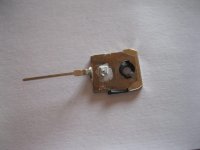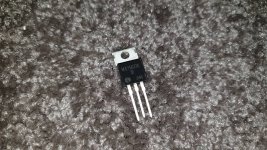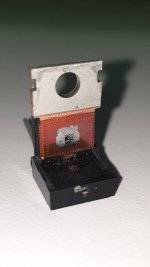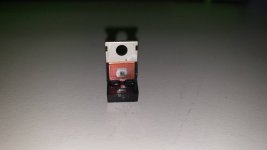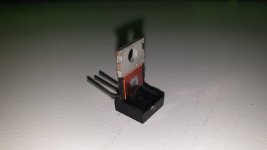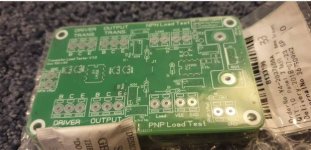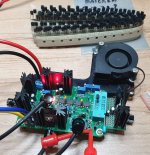Big problem in Latin America, suppose situation in India must be similar.
Fire up your google translator and read:
Transistores Falsificados.
this one is in English:
http://www.sound.westhost.com/counterfeit.htm
Fire up your google translator and read:
Transistores Falsificados.
this one is in English:
http://www.sound.westhost.com/counterfeit.htm
Last edited:
Try googling with the relevant P/N, because it depends completely on what type of transistors you're talking about. If the fakers could label their parts as fakes it would obviously be so much easier for the rest of us
I agree....would save so much time and effort.
If you have some known authentic ones to compare them to under a loupe you can often tell. There are electronic testing procedures that will tell you but the equipment needed gets expensive. Even without a known authentic one using a loupe you will sometime see the old number that they tried to grind off. They get sloppy grinding of the number to make a fake.
Here's a link to an article that I've read a few times: Counterfeit Transistors
Most fakes are of popular but obsolete transistors. NEC 2SD218 and 2SA649 come to mind. So do Toshiba 2SA1333 and 2SC3370 transistors.
If I need to buy an out of produciton transistor, I'll ususally go for an equivalant. STI makes loads of equivalants, and they're usually spot on copies of obsolete transistors.
I've also used Russian surplus transistors and haven't found any real issues with them (other than their crude castings.)
Most fakes are of popular but obsolete transistors. NEC 2SD218 and 2SA649 come to mind. So do Toshiba 2SA1333 and 2SC3370 transistors.
If I need to buy an out of produciton transistor, I'll ususally go for an equivalant. STI makes loads of equivalants, and they're usually spot on copies of obsolete transistors.
I've also used Russian surplus transistors and haven't found any real issues with them (other than their crude castings.)
It's easy:
Is the part discontinued? Then you've bought fakes.
Is the manufactuerer logo wrong? (I E NEC logo on a Toshiba part)? Then you've bought fakes.
Did you buy it from Ebay/Alibaba/etc? Then you've bought fakes.
Did you get it from anywhere but Mouser/Digikey/other very big and well-known store? Then you've bought fakes.
Is the part discontinued? Then you've bought fakes.
Is the manufactuerer logo wrong? (I E NEC logo on a Toshiba part)? Then you've bought fakes.
Did you buy it from Ebay/Alibaba/etc? Then you've bought fakes.
Did you get it from anywhere but Mouser/Digikey/other very big and well-known store? Then you've bought fakes.
It's easy:
Is the part discontinued? Then you've bought fakes.
There's new/old stock out there. It's all but impossible to tell if that's what you're getting is the real deal though, until you receive them.
Radio Shack is all NOS stuff. I get parts from them sometimes. My local RS is practically on the Northwestern University campus, so it is staffed with enthusiastic and knowledgeable nerds like us. They also keep a generous stock of whatever they have, because it flies off the shelves at that location. One time I went there to get PC boards, and they were just restocking the shelves with them. There were two other guys there looking for boards, and between the three of us we bought almost all their boards before they even hit the shelf.
Did you get it from anywhere but Mouser/Digikey/other very big and well-known store? Then you've bought fakes.
Pretty much.
Generally the most counterfeit semiconductors are those with the highest demand for electrical power, for example high power transistors type MJL21193, when we built the P3A of Rod Eliott in 2007 we came across TO3 packages that contained tiny silicon wafers underneath it. white silicone rubber, when turning up the volume they were shorted or overheated excessively ...
I have been a victim of fake transistors. Can anyone please tell me how to identify fakes using a multimeter or any other test that you guys use.
Thanks
If its "cheap", "Ebay" or "Chinese" then its probably a fake.
Only buy from reputable dealers.
Look absolutely nothing like the ones I got from newark in 2012. Those you had to use a 20 W lamp to even see the writing. No notch on the heat tab, either.Got this from Aliexpress. Anyone have an ON Semi MJE15033G from a legit distributor to compare it to. Thanks.
Bought some more bits yesterday at my local store. Was surprised to see that had them available. I have a variety of digikey transistors arriving today and tomorrow to further compare.Look absolutely nothing like the ones I got from newark in 2012. Those you had to use a 20 W lamp to even see the writing. No notch on the heat tab, either.
The shorter leads are the aliexpress variant. Also found some interesting finds at my local store. I reckon someone might have done some swapsies.
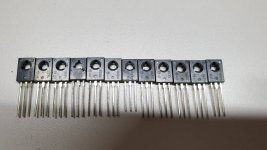
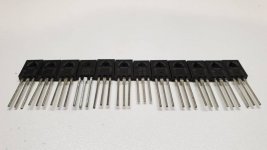
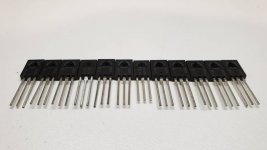
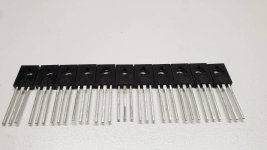
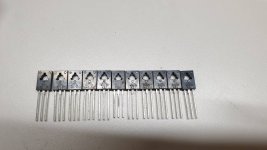
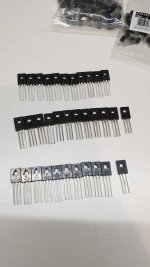
The only ways to tell a fake is take the lid off and check size of die.
Or do a full SOA test of the transistor and see if it survives.
I have a transistor tester that does breakdown voltage which is a good indicator.
Personally, I wouldnt mess about with transistors from dodgy sources any more, just not worth the time or the expense.
Or do a full SOA test of the transistor and see if it survives.
I have a transistor tester that does breakdown voltage which is a good indicator.
Personally, I wouldnt mess about with transistors from dodgy sources any more, just not worth the time or the expense.
What happened was I seen them from the seller when I was buying fuse holders and 1/4w resistors. I would never buy a 2sa1943 from them lol. But thought why not try and see with the other lol.The only ways to tell a fake is take the lid off and check size of die.
Or do a full SOA test of the transistor and see if it survives.
I have a transistor tester that does breakdown voltage which is a good indicator.
Personally, I wouldnt mess about with transistors from dodgy sources any more, just not worth the time or the expense.
Visuals can help you if it´s VERY poorly made, but it´s easy to make a legit looking one.
Personally since I commercially manufacture Guitar amps it´s worth for me to do a real world test.
meaning:
* I check breakdown voltage. Surprisingly, don´t know why, many fakes meet and surpass that; so I guess it´s an easy to reach goal even for fakers, so by itself does not tell me much.
Of course, if it does not even meet that ......
* Hfe at rated current.
Now that is harder to meet.
IF datasheet states, say, Hfe 40 at 4A, I build a simple jig to test that.
Nothing more complicated than a couple resistors, a 12V 4A supply and , of course, a multimeter.
*most significant and impossible to meet unless fake is as good as original, is a second breakdown test.
Wear a full face mask or it will be embedded with tiny plastic shrapnel.
Way too complñicated?
Well, it depends: if you need a couple devices once, just buy from respected distributors.
Now if you need 100 units every Month or two for production, where savings may be significant, it pays to order a small batch and test them; you may be (gratefully) surprised and save big money at the end of the Year.
Personally since I commercially manufacture Guitar amps it´s worth for me to do a real world test.
meaning:
* I check breakdown voltage. Surprisingly, don´t know why, many fakes meet and surpass that; so I guess it´s an easy to reach goal even for fakers, so by itself does not tell me much.
Of course, if it does not even meet that ......
* Hfe at rated current.
Now that is harder to meet.
IF datasheet states, say, Hfe 40 at 4A, I build a simple jig to test that.
Nothing more complicated than a couple resistors, a 12V 4A supply and , of course, a multimeter.
*most significant and impossible to meet unless fake is as good as original, is a second breakdown test.
Wear a full face mask or it will be embedded with tiny plastic shrapnel.
Way too complñicated?
Well, it depends: if you need a couple devices once, just buy from respected distributors.
Now if you need 100 units every Month or two for production, where savings may be significant, it pays to order a small batch and test them; you may be (gratefully) surprised and save big money at the end of the Year.
Last edited:
The last "fake" transistor I bought lasted 10 minutes.
I unplugged my soldering iron and the glitch down the mains blew the transistors.
The glitch must have been greater than breakdown voltage and caused transistors to turn fully on.
I thought maybe it was my crappy power supply so I bought some new defo genuine transistors. I tried very hard to blow them up with arcing, unplugging and general noise on the mains but they wouldn't blow.
Testing a couple isn't always the right thing to do. What happens if the next ones you buy are from a different batch/manufacturer etc ?
I unplugged my soldering iron and the glitch down the mains blew the transistors.
The glitch must have been greater than breakdown voltage and caused transistors to turn fully on.
I thought maybe it was my crappy power supply so I bought some new defo genuine transistors. I tried very hard to blow them up with arcing, unplugging and general noise on the mains but they wouldn't blow.
Testing a couple isn't always the right thing to do. What happens if the next ones you buy are from a different batch/manufacturer etc ?
- Status
- This old topic is closed. If you want to reopen this topic, contact a moderator using the "Report Post" button.
- Home
- Design & Build
- Parts
- How to identify Fake Transistors?
